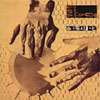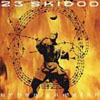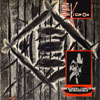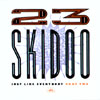23 Skidoo have one of the most fascinating but neglected bodies of work in the annals of the early 80's post-punk/industrial diaspora, so why haven't you heard of them? Directly related to such luminaries as Throbbing Gristle, Cabaret Voltaire, This Heat, Psychic TV, Current 93 and Coil, the Turnbull brothers have nonetheless been reduced to a footnote in most accounts of the genre, which has led to the total unavailability of their material for the last 20 years. The new schedule of CD re-issues of their entire back catalog by 23 Skidoo's own Ronin Records should rectify this situation; they definitely don't deserve their near total obscurity. With a name straight out of Aleister Crowley's "Book of Lies" and a pair of martial arts-trained brothers at the center of the band, 23 Skidoo seem ripe for a critical rediscovery and re-appraisal. Their classic albums and 12" dance singles presage so many of the developments in post-punk, avant-garde and electronic music throughout the 80's and 90's—sampling, tape manipulation, afrobeat fusion, ethnic percussion, drum n' bass, ambient. Their music has become sampling fodder for countless mainstream dance and hip-hop acts. Listening to these albums is like hearing a crate-digging beathead's secret stash of funky basslines and weird breakbeats, all wrapped up in a package of some of the most influential and idiosyncratic music to come out of the industrial era. Spurred on by the release of Soul Jazz's compilation 'In The Beginning, There Was Rhythm', and the renewed interest in the sound of Sheffield circa 1977-84, these re-issues come at a perfect time for listeners to educate themselves on the multifarious sounds of 23 Skidoo.
 It would be hard to imagine a better first album than 23 Skidoo's 'Seven Songs'. A viscerally exciting statement of purpose, and an infectiously listenable album, 'Seven Songs' is probably their most concentrated effort on record. Produced by Genesis P-Orridge and Peter "Sleazy" Christopherson of Coil renown, the album has a nervous, dark atmosphere punctuated by funky basslines, ethnic percussion, and a maze of samples and tape edits. The Turnbull brothers were martial arts experts, reflected in the music's pan-Pacific smorgasbord of influences, and in the "ninja stealth" of the sneakily violent headkicking beats. There is a certain aesthetic perfection here, an intuitive mix of perfectly executed punk-funk that has never really been repeated. Just listen to the opening track "Kundalini", with its phased-noise opening, which is quickly joined by a ring-modulated tribal drumbeat and some aggressive vocal outbursts. The song quickly becomes an intensely funky and nasty hyper-sexualized ecstasy of masculine violence. It's like the audio equivilent of a genocidal terroristic threat. Fans of This Heat, Savage Republic and Muslimgauze, take note. Things get slightly less menacing with the second track "Vegas El Bandito", a fantastic Fela Kuti-influenced afrobeat exploration, with a beautifully paranoid atmosphere and "wokka-ja-wokka" guitars. "Porno Bass" is a beatless soundscape, with windchimes, distorted bass hits, and odd dialogue samples. 'Seven Songs' is a wonderful piece of the industrial puzzle, and a great album in its own right.
It would be hard to imagine a better first album than 23 Skidoo's 'Seven Songs'. A viscerally exciting statement of purpose, and an infectiously listenable album, 'Seven Songs' is probably their most concentrated effort on record. Produced by Genesis P-Orridge and Peter "Sleazy" Christopherson of Coil renown, the album has a nervous, dark atmosphere punctuated by funky basslines, ethnic percussion, and a maze of samples and tape edits. The Turnbull brothers were martial arts experts, reflected in the music's pan-Pacific smorgasbord of influences, and in the "ninja stealth" of the sneakily violent headkicking beats. There is a certain aesthetic perfection here, an intuitive mix of perfectly executed punk-funk that has never really been repeated. Just listen to the opening track "Kundalini", with its phased-noise opening, which is quickly joined by a ring-modulated tribal drumbeat and some aggressive vocal outbursts. The song quickly becomes an intensely funky and nasty hyper-sexualized ecstasy of masculine violence. It's like the audio equivilent of a genocidal terroristic threat. Fans of This Heat, Savage Republic and Muslimgauze, take note. Things get slightly less menacing with the second track "Vegas El Bandito", a fantastic Fela Kuti-influenced afrobeat exploration, with a beautifully paranoid atmosphere and "wokka-ja-wokka" guitars. "Porno Bass" is a beatless soundscape, with windchimes, distorted bass hits, and odd dialogue samples. 'Seven Songs' is a wonderful piece of the industrial puzzle, and a great album in its own right.
samples:
 
 The songs on "Urban Gamelan" have one foot firmly planted in the ancient feudal Orient. When the brothers recorded their 1984 masterpiece Urban Gamelan, they were even more preoccupied with the cold, calculated perfection of the industrial-funk fusion they pioneered. (As a side note, David Tibet of Current 93 was a part of 23 Skidoo's live ensemble during the period leading up to these recordings, although he does not actually appear on the record.) 23 Skidoo's interest in improvised Indonesian percussion, found instruments, afro-beat and funk comes to the fore on this release. The first side builds a giant tower of funk exploration, the highlight being "Fire", in which a wandering bass melody, pounding beat, random echo and zealously screamed vocals meld to form an uneasy dub track which is a lot more creepy than it is rocksteady. This uneasy vibe on all of the tracks is enhanced by the remastering job, which exposes background whispers and electrical drones, lending an air of British esotericism to the ecstatic Zen proceedings. The second side opens with the tense, pressure-cooker trippiness of "Urban Gamelan Pt. 1", an exploratory work for traditional Indo-Pacific chimes and drums. The album's apex is the masterful "Language Dub", which utilizes traditional percussion, wall-of-sound reverb and samples from martial arts films to build a drama that is literally overwhelming. This track fades away into a crystal pool, and we are left with a hauntingly rhythmic swansong.
The songs on "Urban Gamelan" have one foot firmly planted in the ancient feudal Orient. When the brothers recorded their 1984 masterpiece Urban Gamelan, they were even more preoccupied with the cold, calculated perfection of the industrial-funk fusion they pioneered. (As a side note, David Tibet of Current 93 was a part of 23 Skidoo's live ensemble during the period leading up to these recordings, although he does not actually appear on the record.) 23 Skidoo's interest in improvised Indonesian percussion, found instruments, afro-beat and funk comes to the fore on this release. The first side builds a giant tower of funk exploration, the highlight being "Fire", in which a wandering bass melody, pounding beat, random echo and zealously screamed vocals meld to form an uneasy dub track which is a lot more creepy than it is rocksteady. This uneasy vibe on all of the tracks is enhanced by the remastering job, which exposes background whispers and electrical drones, lending an air of British esotericism to the ecstatic Zen proceedings. The second side opens with the tense, pressure-cooker trippiness of "Urban Gamelan Pt. 1", an exploratory work for traditional Indo-Pacific chimes and drums. The album's apex is the masterful "Language Dub", which utilizes traditional percussion, wall-of-sound reverb and samples from martial arts films to build a drama that is literally overwhelming. This track fades away into a crystal pool, and we are left with a hauntingly rhythmic swansong.
samples:
 
 'The Gospel Comes to New Guinea' collects 14 tracks originally issued on 12" singles, EPs and compilations. The material included here is truly some of 23 Skidoo's best, making this compilation essential. The title track opens the compilation brilliantly—an insistently dark and repetitive bassline, complex drums, distant horns, and strange human chanting buried way under the mix. This is a breathtaking 10-minute exploration of the depths of the tense rhythmic atmosphere that the band is able to evoke. Also on this compilation is 23 Skidoo's most commonly sampled track, the tightly wound, dance-oriented "Coup". Listeners will recognize the famous bassline later sampled on Chemical Brothers' "Block-Rockin' Beats" and Grandmaster Flash's "White Lines." This collection also includes a handful of actual "rock" songs with full vocal parts, quite rare in the Turnbull brothers' oevre. These fleshed out vocal tracks resemble Gang of Four meets This Heat, and point to a wholly different direction that sounds so tantalizingly great, it seems a shame the band never really explored this sound for a full album. Later in the compilation, there are some of 23 Skidoo's dance singles from the mid-80's. These are some very unique and exciting songs, merging early techno, acid house, record scratching and beat sampling with 23 Skidoo's usual array of congas, tablas and gamelan percussion. This material has held up amazingly well, in constrast to many of the more well known house-influenced material from the period. Psychic TV, I am looking in your direction,...
'The Gospel Comes to New Guinea' collects 14 tracks originally issued on 12" singles, EPs and compilations. The material included here is truly some of 23 Skidoo's best, making this compilation essential. The title track opens the compilation brilliantly—an insistently dark and repetitive bassline, complex drums, distant horns, and strange human chanting buried way under the mix. This is a breathtaking 10-minute exploration of the depths of the tense rhythmic atmosphere that the band is able to evoke. Also on this compilation is 23 Skidoo's most commonly sampled track, the tightly wound, dance-oriented "Coup". Listeners will recognize the famous bassline later sampled on Chemical Brothers' "Block-Rockin' Beats" and Grandmaster Flash's "White Lines." This collection also includes a handful of actual "rock" songs with full vocal parts, quite rare in the Turnbull brothers' oevre. These fleshed out vocal tracks resemble Gang of Four meets This Heat, and point to a wholly different direction that sounds so tantalizingly great, it seems a shame the band never really explored this sound for a full album. Later in the compilation, there are some of 23 Skidoo's dance singles from the mid-80's. These are some very unique and exciting songs, merging early techno, acid house, record scratching and beat sampling with 23 Skidoo's usual array of congas, tablas and gamelan percussion. This material has held up amazingly well, in constrast to many of the more well known house-influenced material from the period. Psychic TV, I am looking in your direction,...
samples:
 
 23 Skidoo's second collection of singles, EPs and dance mixes, 'Just Like Everybody Part Two' is mostly drawn from their mid-80's output. This compilation is not as immediately likable as 'New Guinea,' as some of the more obviously hip-hop influenced tracks included have not aged very well. The horn trills on "Roninstep" sound a little cheesy, and the song unfolds in a rather predictable way. The production is still top-notch, but 23 Skidoo have picked up a little too much of the slick, faux-jazz sound of their less creative contemporaries, and pushed their ethno-funk fusion to the background. Looking back, some of the sampling and record scratching sounds a little clinical, as if the band was self-consciously pushing itself in a direction that may not have been completely in line with their natural evolution. That said, there are still some great moments here, several terrific songs with infectious beats and sample-ready breakbeats. The CD ends with an interesting retread of on of their greatest songs, "Coup." "Recoup" picks up the same tasty bassline, but adds some interesting horn fanfare, an occasional dub echo, and a complementary piano melody. An interesting, if unnecessary, update of their classic track.
23 Skidoo's second collection of singles, EPs and dance mixes, 'Just Like Everybody Part Two' is mostly drawn from their mid-80's output. This compilation is not as immediately likable as 'New Guinea,' as some of the more obviously hip-hop influenced tracks included have not aged very well. The horn trills on "Roninstep" sound a little cheesy, and the song unfolds in a rather predictable way. The production is still top-notch, but 23 Skidoo have picked up a little too much of the slick, faux-jazz sound of their less creative contemporaries, and pushed their ethno-funk fusion to the background. Looking back, some of the sampling and record scratching sounds a little clinical, as if the band was self-consciously pushing itself in a direction that may not have been completely in line with their natural evolution. That said, there are still some great moments here, several terrific songs with infectious beats and sample-ready breakbeats. The CD ends with an interesting retread of on of their greatest songs, "Coup." "Recoup" picks up the same tasty bassline, but adds some interesting horn fanfare, an occasional dub echo, and a complementary piano melody. An interesting, if unnecessary, update of their classic track.
samples:
 
Read More

